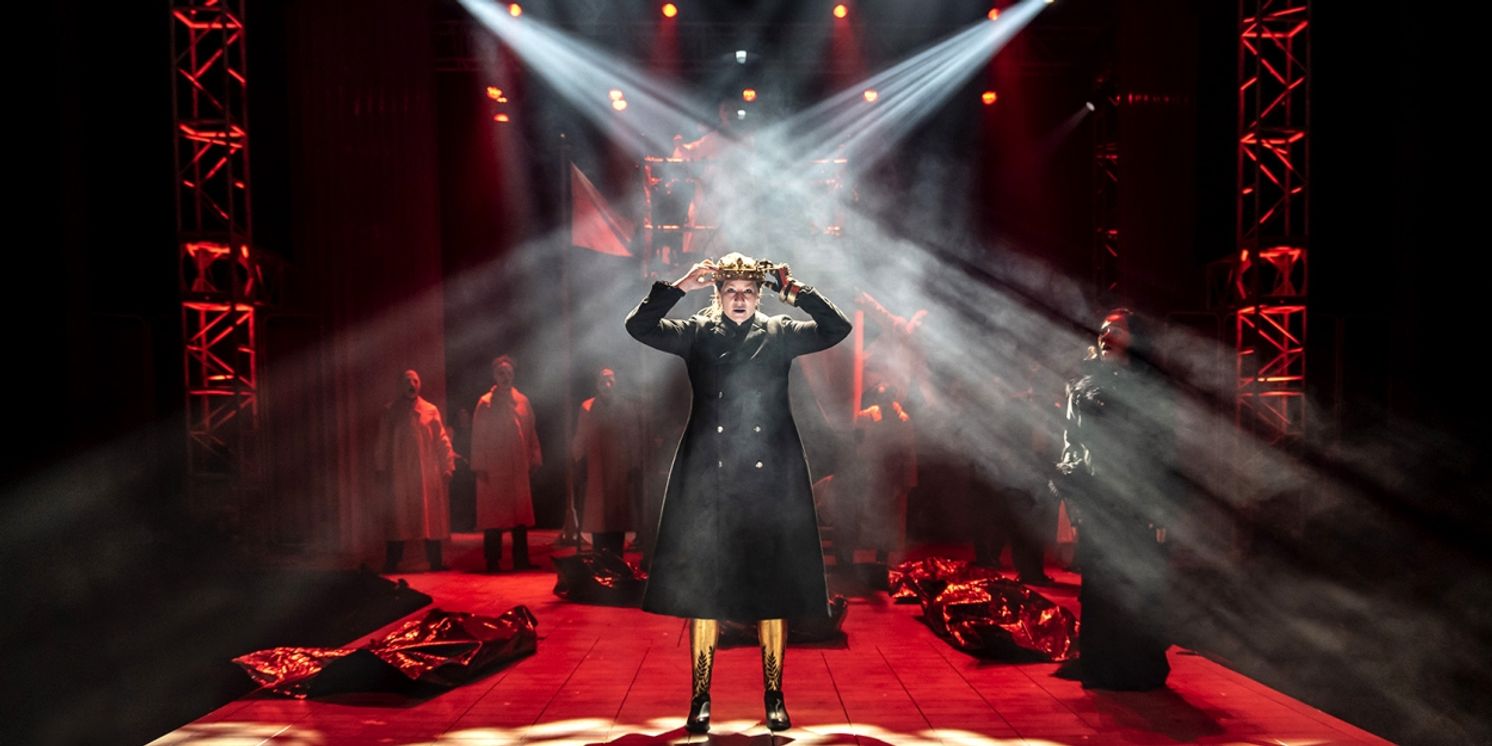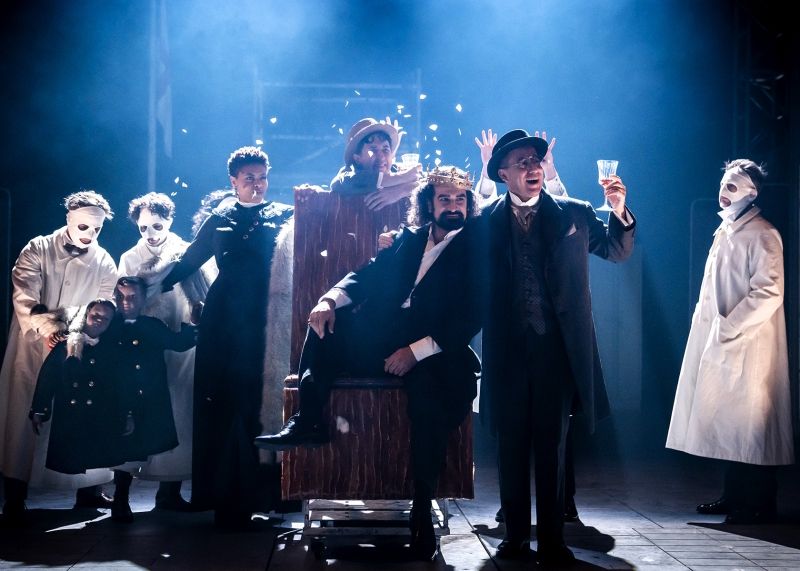Review: RICHARD III at Chicago Shakespeare Theater
The darkly comic historical thriller runs through March 3.

What does it mean to see the "rudely stamped... deformed, unfinished" body of Richard III on stage? Even Shakespeare's contemporaries didn't quite know how to answer this question. The prevailing view of Elizabethan England was that disability acted as God's warning sign, that those with disabilities were inherently villainous and therefore marked as such. But Shakespeare's Richard declares that his disability---and the ways he has been mistreated by others because of it---is actually the cause of his treachery. Is Shakespeare merely parroting the prevailing religious ideas of his own time? Or is he questioning the superstitious logic of disability that prevailed in the 1590s? And what are we to make of Richard in our own time, in an age when we have rightly questioned the ways society unjustly stigmatizes disability? As the scholar Jeffrey R. Wilson recently wrote, "Shakespeare created more questions than he answered when characterizing Richard" with a "deformity." Perhaps these questions can never be adequately answered, even in our enlightened age. Thankfully, the Chicago Shakespeare Theater's latest production of RICHARD III gives audiences a macabre puzzlebox of pleasures that revels in the complexity of these riddles. The darkly comic historical thriller runs through March 3 at CST's Courtyard Theater.
Perhaps the most admired of Shakespeare's history plays, RICHARD III tells of the rise and fall of one of the most infamous anti-heroes in English literature. Mistreated by the court as a result of his disfigurement, Richard (Katy Sullivan) plots to turn his brothers Edward (Demetrios Troy) and George (Scott Aiello) against one another before murdering both. But Edward has sons and allies that prevent Richard's ascension to the throne. As the body count mounts and Richard finally claims his crown, he realizes too late that his own plots and tricks are being turned against him. For any audience members unfamiliar with the history of the War and the Roses and its bloody outcome, CST has helpfully included a brief plot synopsis in the program.
That being said, the synopsis may not even be necessary. CST's new Artistic Director Edward Hall has approached the play with such exquisite care and clarity that even newcomers to Shakespeare will be enraptured with all the intricacies of court politics. Hall rearranges parts of the original text in ingenious ways, making the plot easier to follow and emphasizing Richard's undeniable charisma. Rather than starting with George of Clarence's march to the Tower of London, audiences instead see the decadent frivolity that prevails at Edward's court. The first half of the play ends with the swift, unexpected execution of Lord Hastings (Erik Hellman), and the second half opens with the citizens of London fiercely debating the tumultuous matter of who shall inherit the throne from Edward. Changes such as these help propel the plot in dramaturgically exciting ways, especially in an age when audiences have little patience for extended runtimes and multiple intermissions.
Of course, the bulk of the play rests entirely on the historically hunchbacked shoulders of the titular role, and Katy Sullivan has risen to the challenge with fiery confidence and a delightful degree of good humor. A Tony nominee and Paralympic athlete, Sullivan is the first woman with a disability in a professional production to play the part, and she doesn't shy away from the physicality demanded of the role. In fact, her confidence and comfort in moving her body around the stage demand that viewers question the discomfort they may feel when witnessing disability. Equally impressive is how Sullivan delivers Shakespeare's intricate dialogue and soliloquies with fluency and flair. She knows exactly which words and phrases to stress to convey a scene's literal and emotional meaning, and she has great fun while doing so. Nowhere does this talent shine through more clearly than in Richard's courtship of the recently widowed Lady Anne (Jaeda LaVonne) early in the play. Those who have only ever read Shakespeare's script may be at a loss as to how Anne could be wooed into marriage by Richard, the very man who killed her husband and father-in-law. But Sullivan's desperate exclamations of love are so convincingly delivered that even audiences can briefly forget that Richard himself is merely acting a part.
Sullivan's Richard is also darkly funny, provoking delighted guffaws from viewers with her wry smile and sardonic delivery. One of the night's biggest laughs comes when she declares, "I thank God for my humility," just after committing Richard's young nephews to the Tower of London and launching another campaign for the crown. Sullivan isn't the only actor on stage with this talent, though. Debo Balogun delights as the executioner Richard Ratcliffe, delivering his lines with a dry boredom that contrasts with the bloody excitement of his profession. Mo Shipley and Mark Bedard operate the puppets that stand in for Edward's rambunctious sons and elicit shocked laughs when the boys mock their disfigured uncle. Speaking broadly, Hall has done a commendable job of capturing the humor inherent in Shakespeare's linguistic fireworks, which makes the horror of the play's later scenes all the more jarring.
Not all of the jokes may land, though. The two murderers (again, Shipley and Bedard) that dispatch George of Clarence are played as 1920s vaudevillians with Brooklyn accents. The creative choice feels out of place from the rest of the production's grimy Victorian aesthetics. Some of the other murders feel similarly ridiculous, which might be admirable if one could be sure that the humor is intentional.

But these moments never detract from the production's other powerful performances. Libya V. Pugh exudes a formidable stage presence as Queen Margaret, the widow of King Henry VI who preceded Edward in holding the throne. Her vehement curses are delivered with such venom that they reverberate throughout the play even without other characters drawing attention to them, and she haunts us with her mocking laughter while exiting through the audience in her final scene. Yao Dogbe serves as a sympathetic and surprisingly charming Duke of Buckingham, the ally to Richard who realizes too late how far his patron will go to ensure his reign is total. While these performances immediately stand out in the mind hours after the play concluded, there is no denying that Hall has assembled a powerful ensemble of actors that encourage one another to take exciting risks that pay off handsomely more often than not.
Hall's vision is also brought to life through the exquisite efforts of his design team. As mentioned earlier, Michael Pavelka's scenic and costume design recalls the foreboding darkness of Bedlam in 1800s London. When not immediately involved in a scene, ensemble members stalk the audience in white coats and hoods that make their expressions inscrutable. The sudden appearance of one walking behind my row gave viewers a pleasant fright on more than one occasion. A menacing operating table doubles as a throne and executioner's block, and a plastic surgery curtain that flies across the stage foreshadows the sheer volume of blood about to be spilled across the stage. Marcus Doshi's lighting design helps convey when Richard is speaking directly to the audience in asides while also creating stunning patterns of shadows reminiscent of prison bars or thorny vines. Jon Trenchard provides original music for the play, with songs running the gamut from mournful religious hymns to unsettling nursery rhymes to raucous rock anthems. Not every musical motif fits the play's other parts, but all land with equal aplomb thanks to Pornchanok Kanchanabanca's haunting sound design.
Altogether, Edward Hall's first production as Chicago Shakespeare Theater's Artistic Director represents a triumph of a bold creative vision brought beautifully to life (and death) by actors and designers committed to exploring the Bard's continued relevance for the 21st century. If Hall's RICHARD III is any indication of what Chicago audiences can come to expect during his tenure, they would do well to cheer, "Long live the king."
Photo Credit: Liz Lauren
Reader Reviews

Videos

